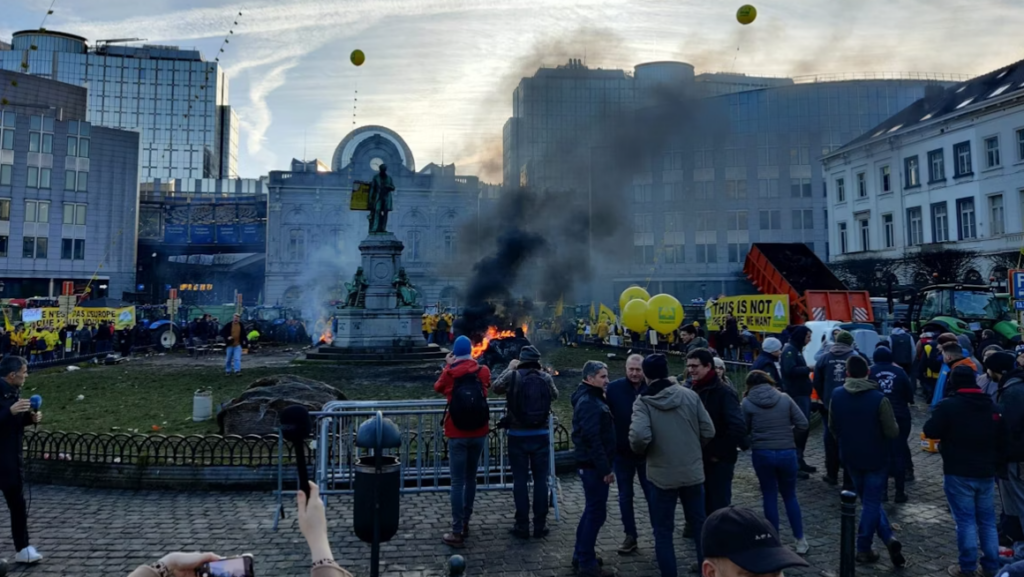
Published February 22, 2024
Europe’s recent spate of protests by farmers may appear to involve a coincidental concurrence of otherwise unrelated concerns. They weren’t.
The EU’s Green Deal goals are inexorably in conflict with its agricultural industry. These protests, successful as they were, will be only the first in a series of peasant revolts unless the EU changes course and scales back its climate ambitions.
The Green Deal’s massive ambition means it must upend the EU’s rural population. Its goal of 90 per cent reduction in greenhouse gas emissions by 2024, compared with 1990 levels, cannot be accomplished by tinkering around the edges.
Every part of the European economy must be transformed to meet this goal, farming included.
Farming is perhaps a fitting place for popular discontent to first arise. Europe’s farmers have been protected and subsidised for decades through the EU’s Common Agricultural Policy.
This maze of subsidies, import controls, and regulations has helped boost EU food production above that which pure market forces would have allowed. The result is that the share of workers who are employed in agriculture is much higher in many EU countries than in farming powerhouses like the United States and Canada.
This makes farming an attractive place for climate warriors to make an initial focus. Farmers comprise a small, easily targetable portion of the population while also being a sector propped up by state intervention.
One can imagine a political outcome where urban consumers join with climate activists to force changes to farming, resulting in a theoretical win-win of lower food prices and decreased greenhouse gas emissions.
The fact that this fantasy scenario came crashing down so quickly shows the political folly of the Green Deal generally.
Europeans’ standard of living depends on the release of greenhouse gasses, whether directly through consumption of electricity or fossil fuels or indirectly through the consumption of meat or the use of pesticides to increase agricultural yields.
Any attempt to seriously curtail those emissions will cause economic pain to those affected. They will naturally resist, through protests or ultimately at the voting booth.
Farmers may be only a small part of the population, but they wield outsized influence everywhere for cultural and economic reasons.
Culturally they are seen as custodians of an historical way of life, one that retains an attraction for stressed urban workers.
Economically, farming is an economic engine for smaller and medium-sized communities that are not attractive for modern industrial or knowledge-based industries. They thus appeal to the urban dweller emotionally while attracting more popular support from rural elements because of the rural population’s dependence on agriculture to support their other jobs.
That combination is clearly why the farmer protests could succeed so quickly and spectacularly.
EU leaders could see that the broader electorate was not on their side. With EU elections approaching, it was wiser to retreat now in the hope that pro-Green Deal forces would be in a stronger position afterwards.
That, however, is mere hope unsupported by logic. There is no example within the EU of a strong climate policy that has emerged unscathed from serious political backlash.
Germany’s coalition government, for example, had to water down its proposed home boiler regulation when homeowners rebelled.
Trying to force the same policies down unwilling throats after the summer vote will only exacerbate the continent’s drift toward populism, something that frightens Brussels mandarins to their core.
The farmer revolt is also indicative of a continental trend towards a politics of city against countryside.
The Central European nations have clear rural/urban political divides, as can be seen in the recent Slovakian and Polish votes.
But the same is increasingly true in Western Europe. The populist AfD and Freie Wahler gained vote share most in rural Bavaria in last year’s Land election.
Populist parties such as Sweden’s Sweden Democrats and the Netherlands’ PVV also fared much better in smaller and rural communities than they did in the larger cities. Pushing forward with anti-farmer Green policies will only exacerbate this shift.
EU leaders should see the protests as a warning sign and adapt accordingly.
Sustainable progress against climate change will only arise through incremental, not revolutionary, policies. Support for research into things like pesticides or fertilizers that release fewer greenhouse gasses will be much wiser than trying to revamp the entire economy in a generation.
Europe’s aging electorate will be less, not more, open to dramatic change over time. This year’s farmer’s protests will be mild in comparison to what will come if Europe’s leaders fail to take note.
Henry Olsen, a senior fellow at the Ethics and Public Policy Center, studies and provides commentary on American politics. His work focuses on how America’s political order is being upended by populist challenges, from the left and the right. He also studies populism’s impact in other democracies in the developed world.











